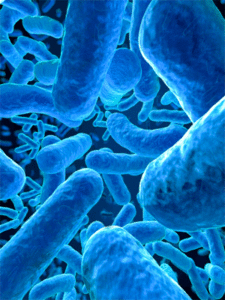 Since participating in the very first Earth Day on April 22, 1970, I’ve had heightened awareness of the delicate global ecosystem on which all planetary life depends. In recent weeks, I’ve been learning about an equally important, life-giving ecosystem: my microbiome. It consists of trillions of bacteria, viruses, and fungi that inhabit virtually every part of my body. And it turns out, they’re crucial to my health and longevity.
Since participating in the very first Earth Day on April 22, 1970, I’ve had heightened awareness of the delicate global ecosystem on which all planetary life depends. In recent weeks, I’ve been learning about an equally important, life-giving ecosystem: my microbiome. It consists of trillions of bacteria, viruses, and fungi that inhabit virtually every part of my body. And it turns out, they’re crucial to my health and longevity.
The colon serves as host to most of the microbiome. This collective of microorganisms break down fibers, digest starch and lactose, and make vitamins and amino acids that are transmitted into the bloodstream for the body’s use. They also help regulate metabolism and blood sugar, and participate actively in our immune system. As a case in point, our “good bacteria” protect us against “bad bacteria” by minimizing the habitable space available for intruders while secreting substances that prove inhospitable to them.
Just as diversity is a hallmark of health in our external environment, a diverse microbiome is essential for our internal environment. A healthy individual hosts a small number of highly abundant species and a large number of highly specialized ones. The latter provide the genetic blueprints to produce enzymes to eat unfamiliar plants and animals. They also have the ability to “bloom” when called upon to respond to atypical or virulent microbial threats.
The microbiome in our guts also affects our brains. They make substances like gangliosides that our neurons use to build their cell walls. They also contribute to the manufacture of 80% of the body’s serotonin, a substance known to influence mood. As such, a disturbance in microbiome diversity could translate into disordered mental or emotional functioning.
Chronic disease, food allergies, and even obesity have been linked to low microbiome diversity. Early evidence suggests that the Standard American Diet rich in sugar, meat, and processed foods may result in a distorted ratio of microbiota that results in extraction and absorption of excess calories from food.
In Missing Microbes: How the Overuse of Antibiotics is Fueling Our Modern Plagues, Dr. Martin J. Blaser, MD sounds the five-alarm bell to cease-and-desist unnecessary practices that damage our microbiome. Over prescription of antibiotics tops the list. These drugs are used frequently in response to respiratory infections that are caused by viruses impervious to antibacterial agents. Meanwhile, broad-spectrum antibiotics attack good as well as bad bacteria. Vital, small population strains may be wiped out permanently. Resistant strains, fungi, and yeasts are free to grow without the control present in a healthy competitive environment. Should any of these bacterial strains prove harmful, a more potent dose of antibiotics may be required to eradicate them… leaving super-resistant strains in their wake. Unfortunately, pharmaceutical companies may not keep pace with the development of all these resistant strains.
Those who choose to avoid antibiotics unless medically necessary may still get “dosed” via the meat and poultry they consume. According to Dr. Blaser, 70-80% of all antibiotic sales go toward fattening up farm animals. Animals that habitually take antibiotics gain more weight per pound of feed than their drug-free counterparts. Hmmm… could be another reason why organic meats are more expensive!
What should we do to maintain a healthy microbiome?
First and foremost: Avoid taking antibiotics unless absolutely necessary. Dr. Blaser notes that a 1-week course of antibiotics can leave resistant strains of bacteria 3+ years later!
Second: Minimize meat consumption and/or focus on products produced by organic, pasture-raised animals. Increase consumption of fresh fruits and vegetables. Avoid sugar and processed foods.
Third: Opt for soap and water instead of antibacterial sanitizers to cleanse hands unless visiting or living with a sick friend or family member. Many, many bacterial strains are our friends!
Fourth: Lower stress and exercise more. Stress creates a cascade of symptoms that produces inflammation in the body – including the gut. It makes us more susceptible to infection and disease. Exercise is a natural stress reliever and contributions to the production of mood-elevating endorphins.
While some practitioners advocate for use of prebiotics and probiotics for gut health, Dr. Blaser claims that there are no scientifically verified studies to attest to their efficacy. That being said, he deems them generally safe for use by a healthy individual.